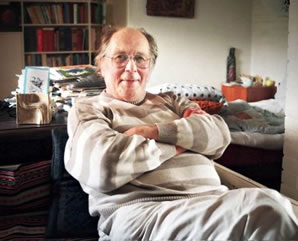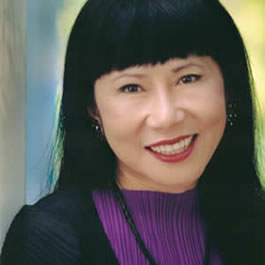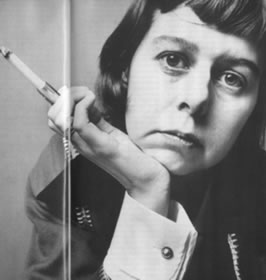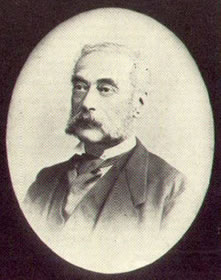De Amerikaanse schrijfster en essayiste Siri Hustvedt werd geboren op 19 februari 1955 in Northfield, Minnesota. Zie ook mijn blog van 19 februari 2007
Uit: The Sorrows of an American
„My sister called it “the year of secrets,” but when I look back on it now, I’ve come to understand that it was a time not of what was there, but of what wasn’t. A patient of mine once said, “There are ghosts walking around inside me, but they don’t always talk. Sometimes they have nothing to say.” Sarah squinted or kept her eyes closed most of the time because she was afraid the light would blind her. I think we all have ghosts inside us, and it’s better when they speak than when they don’t. After my father died, I couldn’t talk to him in person anymore, but I didn’t stop having conversations with him in my head. I didn’t stop seeing him in my dreams or stop hearing his words. And yet it was what my father hadn’t said that took over my life for a while—what he hadn’t told us. It turned out that he wasn’t the only person who had kept secrets. On January sixth, four days after his funeral, Inga and I came across the letter in his study.
We had stayed on in Minnesota with our mother to begin tackling the job of sifting through his papers. We knew that there was a memoir he had written in the last years of his life, as well as a box containing the letters he had sent to his parents—many of them from his years as a soldier in the Pacific during World War II—but there were other things in that room we had never seen. My father’s study had a particular smell, one slightly different from the rest of the house. I wondered if all the cigarettes he’d smoked and the coffee he’d drunk and the rings those endless cups had left on the desk over forty years had acted upon the atmosphere of that room to produce the unmistakable odor that hit me when I walked through the door. The house is sold now. A dental surgeon bought it and did extensive renovations, but I can still see my father’s study with its wall of books, the filing cabinets, the long desk he had built himself, and the plastic organizer on it, which despite its transparency had small handwritten labels on every drawer—“Paper Clips,” “Hearing Aid Batteries,” “Keys to the Garage,” “Erasers.”

Siri Hustvedt (Northfield, 19 februari 1955)
De Estlandse schrijver Jaan Kross werd geboren op 19 februari 1920 in Tallin. Zie ook mijn blog van 19 februari 2007 en ook mijn blog van 19 februari 2008.
Uit: Treading Air (Vertaald door Eric Dickens)
„My immediate superior in this new job was, as said above, the private secretary to the Prime-Minister, Major Tilgre. He no doubt came from the fertile province of Mulgimaa, but was, for all that, a particularly dry individual, a thoroughly correct man of around forty-five. In actual fact, Tilgre had less to do with me than Head of Chancery Terras who was in formal terms a much higher and more distant boss. This smallish man was the soul of discretion, came originally from the Virumaa province near the capital and had graduated from Saint Petersburg University. He had qualities ideal for a civil servant – he was entirely inconspicuous. But he was always there when he was needed. And inconspicuous, thus indispensable, to such a degree that he stayed in his post for over twenty years, during all the changes of government which Estonia underwent. And what’s more, he stayed at his post even during the first few weeks of 1946, that is to say during Barbarus’ time as prime-minister, until one of the informers in place by that time noticed, and the inevitable came to pass. The Head of the Chancery was arrested and given the choice of dying a year later what was a normal death at the Solikam labour camp, of hunger and dysentery, or to freeze to death, which, God rest his soul, was, as we all know, the normal death for someone of his calibre.“

Jaan Kross (19 februari 1920 – 27 december 2007)
De Duitse schrijver Herbert Rosendorfer werd op 19 februari 1934 in Gries geboren. Zie ook mijn blog van 19 februari 2007 en ook mijn blog van 19 februari 2008.
Uit: Letters Back to Ancient China (Vertaald door Michael Mitchell)
“My dear friend Dji-gu,
The future is an abyss. I think I wrote that on the note I placed at the contact point for you three days ago (I hope it reached you so that you will not be worrying about my safe arrival). The things I have seen here are so completely different from everything to which you and I are accustomed, that I do not know where to start. Here – actually I shouldn’t say ‘here’, I should say ‘now’, but this ‘now’ is so unimaginably foreign that I find it difficult to believe that this is the same place where you are living, even if separated by the space of a thousand years. A thousand years. Now I realise that that is a stretch of time which the human mind cannot encompass. Of course, you can start counting, one, two, three … until you reach a thousand, and try to imagine that with each number a year passes, generations come and go, emperors, even whole dynasties change, the stars pursue their courses … but I tell you, a thousand years is more than mere elapsed time: a thousand years is such a colossal mountain of time that even the boldest imagination cannot spread its wings and fly over it.
A thousand years is not ‘now’ and ‘ then’, a thousand years is ‘here’ and ‘there’. I will stick to ‘here’.
I’m glad I managed to find the contact point again, where I am going to deposit this letter. For that I have to thank a man who has helped me very much and is still helping me. More about him later. I could not have found the point without someone else’s help, for our Kai-feng has changed so completely that it seems like a different city to me. That may perhaps be connected with the fact that the river has changed direction; now it flows almost due north. The city has grown incredibly large and almost unbearably noisy. From what I have seen so far, there is not the least trace left of any of those palaces, which looked to us as if they were built for eternity, not to mention ordinary houses. Even the hills have gone. Everything is flat.”

Herbert Rosendorfer (Gries, 19 februari 1934)
De Russische schrijver Dmitri Lipskerov werd geboren op 19 februari 1964 in Moskou. Zie ook mijn blog van 19 februari 2007 en ook mijn blog van 19 februari 2008.
Uit: Le Dernier Rêve de la Raison
„Ilya Ilyassov le Tatare vendait du poisson frais dans un magasin qui s’appelait « Alimentation ». Ce vendeur avait entre autres à sa disposition un grand comptoir de marbre, couvert des entailles qu’avait causées un énorme trancheur, alourdi de morceaux de plomb pour que le couteau ne glisse pas de la main quand on avait affaire à un poisson particulièrement grand, dont il n’était pas facile d’ouvrir le ventre dur.
Pour être plus précis, Ilya n’était pas supposé se limiter au poisson frais, pêché sur place dans un grand aquarium aux eaux sombres, à l’aide d’une épuisette dont le manche de chêne avait été poli à en briller par ses mains calleuses : le Tatare vendait aussi du poisson surgelé, qu’il ne considérait pas comme du poisson, mais les demandes insistantes des clients l’avaient obligé à en fournir. Les clients expliquaient que le poisson congelé convenait bien pour les tourtes au levain, agrémentées d’œufs durs émiettés. D’un autre côté, il était bon en simple friture à la chapelure, et il était également irremplaçable pour nourrir toutes sortes d’animaux domestiques — chats, chiens…, une gentille créature d’âge vénérable nourrissait même de cabillaud congelé un canari à la voix puissante, qui mourut bientôt de la très profonde solitude dans laquelle il se trouvait.“

Dmitri Lipskerov (Moskou, 19 februari 1964)
De Engelse schrijfster Helen Fielding werd geboren in Morley, Yorkshire op 19 februari 1958. Fielding begon met columns te schrijven onder het pseudoniem Bridget Jones in de krant The Independent. Door het succes hiervan besloot Helen Fielding een boek te schrijven over Bridget Jones. Het boek Bridget Jones’s Diary kwam in 1996 uit en werd in 2001 verfilmd met in de hoofdrollen Renée Zellweger, Colin Firth en Hugh Grant.
Uit: Bridget Jones’s Diary
„Noon. London: my flat. Ugh. The last thing on earth I feel physically, emotionally or mentally equipped to do is drive to Una and Geoffrey Alconbury’s New Year’s Day Turkey Curry Buffet in Grafton Underwood. Geoffrey and Una Alconbury are my parents’ best friends and, as Uncle Geoffrey never tires of reminding me, have known me since I was running round the lawn with no clothes on. My mother rang up at 8:30 in the morning last August Bank Holiday and forced me to promise to go. She approached it via a cunningly circuitous route.
“Oh, hello, darling. I was just ringing to see what you wanted for Christmas.”
“Christmas?”
“Would you like a surprise, darling?”
“No!” I bellowed. “Sorry. I mean …”
“I wondered if you’d like a set of wheels for your suitcase.”
“But I haven’t got a suitcase.”
“Why don’t I get you a little suitcase with wheels attached. You know, like air hostesses have.”
“I’ve already got a bag.”
“Oh, darling, you can’t go around with that tatty green canvas thing. You look like some sort of Mary Poppins person who’s fallen on hard times. Just a little compact case with a pull-out handle. It’s amazing how much you can get in. Do you want it in navy on red or red on navy?”
“Mum. It’s eight-thirty in the morning. It’s summer. It’s very hot. I don’t want an air-hostess bag.”

Helen Fielding (Morley, 19 februari 1958)
De Amerikaanse schrijfster Amy Tan werd geboren in Oakland, Ohio, op 19 februari 1952. Zie ook mijn blog van 19 februari 2007 en ook mijn blog van 19 februari 2008.
Uit: The Best American Short Stories 1999
“The following year, I was in another English class at another college, and the same novel was assigned. This time I wrote a theme paper that noted the brilliant characterization – how, despite the
panorama of events and the opportunities afforded these characters, nothing much had changed in their lives, and how this so convincingly captured the realism of ennui. It represented the pervasive American sense of a lost generation whose lives, singly or together, held no hope or direction. My paper received high praise.
By the time I graduated, I was sick of reading literary fiction. My osmotic imagination had changed into one with filters, lint traps. I thought that literary tastes were an established norm that depended on knowing what others more expert than I thought was best.
For the next twelve years, I read an occasional novel. But I did not return to my habit of reading a story a day until 1985. By then I had become a successful but unhappy person, with work that was
lucrative but meaningless. This was one of those moments that cause people to either join a religious cult, spend a lot of money on psychotherapy, or take up the less drastic and more economical
practice of writing fiction.”

Amy Tan (Oakland, 19 februari 1952)
De Amerikaanse schrijfster Carson McCullers werd geboren als Lula Carson Smith 19 februari 1917 in Columbus, Georgia. Zie ook mijn blog van 19 februari 2007
Uit: The Member of the Wedding
“It happened that green and crazy summer when Frankie was twelve years old. This was the summer when for a long time she had not been a member. She belonged to no club and was a member of nothing in the world. Frankie had become an unjoined person who hung around in doorways, and she was afraid. In June the trees were bright dizzy green, but later the leaves darkened, and the town turned black and shrunken under the glare of the sun. At first Frankie walked around doing one thing and another. The sidewalks of the town were gray in the early morn
ing and at night, but the noon sun put a glaze on them, so that the cement burned and glittered like glass. The sidewalks finally became too hot for Frankie’s feet, and also she got herself in trouble. She was in so much secret trouble that she thought it was better to stay at home—and at home there was only Berenice Sadie Brown and John Henry West. The three of them sat at the kitchen table, saying the same things over and over, so that by August the words began to rhyme with each other and sound strange. The world seemed to die each afternoon and nothing moved any longer. At last the summer was like a green sick dream, or like a silent crazy jungle under glass. And then, on the last Friday of August, all this was changed: it was so sudden that Frankie puzzled the whole blank afternoon, and still she did not understand.
“It is so very queer,” she said. “The way it all just happened.”
“Happened? Happened?” said Berenice.
John Henry listened and watched them quietly.
“I have never been so puzzled.”
“But puzzled about what?”
“The whole thing,” Frankie said.”

Carson McCullers (19 februari 1917 – 29 september 1967)
De Duitse dichter en schrijver Thomas Brasch werd geboren in Westow,Yorkshire (Engeland) op 19 februari 1945. Zie ook mijn blog van 19 februari 2007 en ook mijn blog van 19 februari 2008.
Was ist das
Was ist das zwischen einsam und allein
als wär ich nur vergangen wie im Flug
rings um die Erde doch ein Stein
bin ich mir nicht geworden. Ach genug
für einen zweiten andren Flug hab ich
noch Kraft und Lüfte auch.
Dass ich mich endlich selber brauch
.

Thomas Brasch (19 februari 1945 – 3 november 2001)
Zie voor nog meer schrijvers van de 19e februari ook mijn vorige blog van vandaag.









